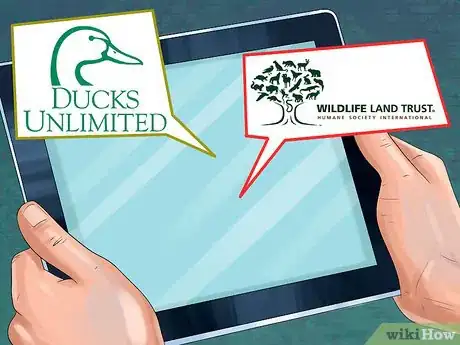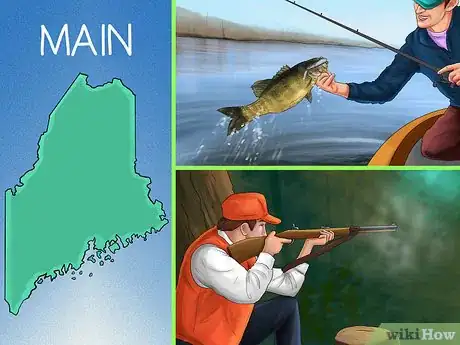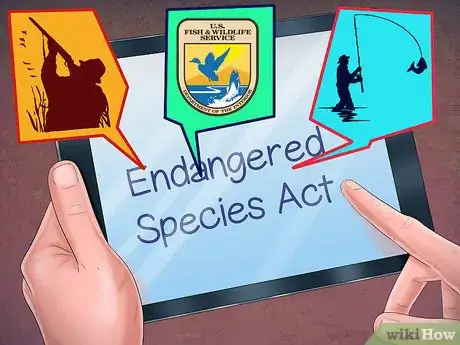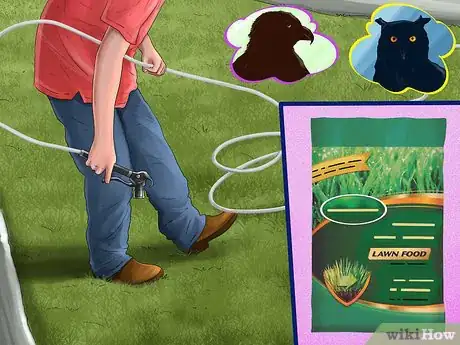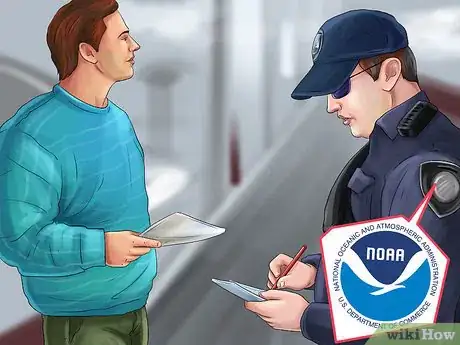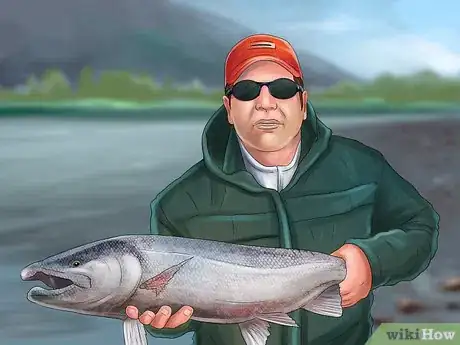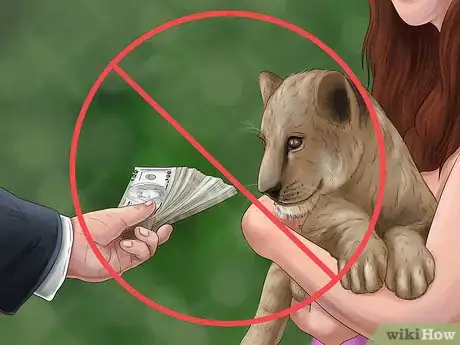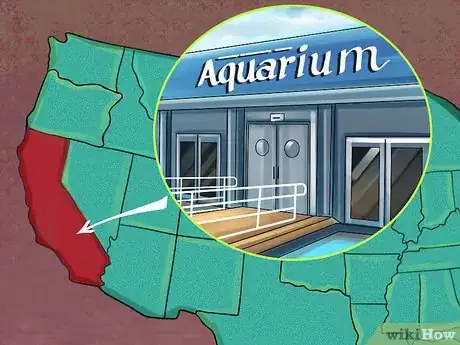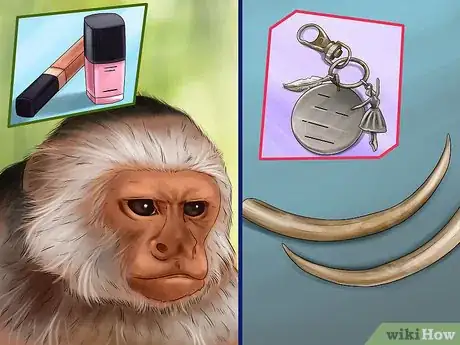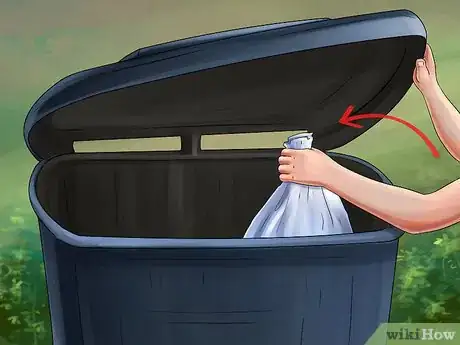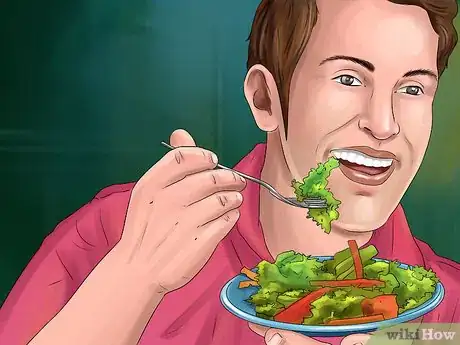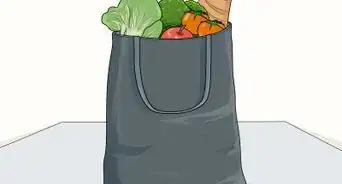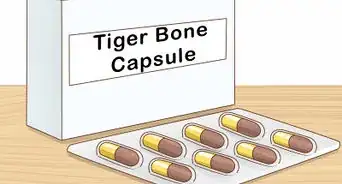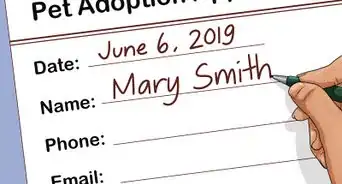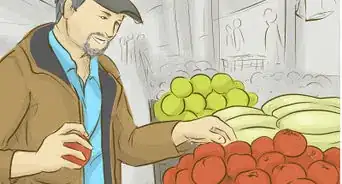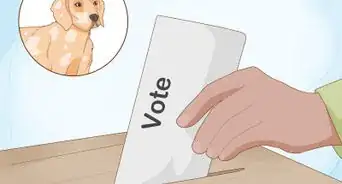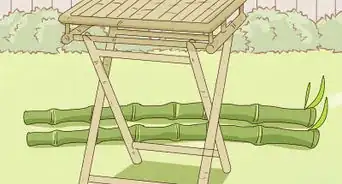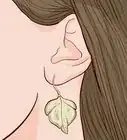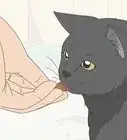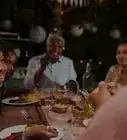This article was co-authored by Clinton M. Sandvick, JD, PhD. Clinton M. Sandvick worked as a civil litigator in California for over 7 years. He received his JD from the University of Wisconsin-Madison in 1998 and his PhD in American History from the University of Oregon in 2013.
There are 26 references cited in this article, which can be found at the bottom of the page.
This article has been viewed 18,392 times.
Protecting wildlife can take many forms and can happen almost anywhere. Whether you want to protect wildlife on private property, government land, or in the water, there are things you can do to achieve your goals. For example, you might execute a conservation easement to protect your land, you might report illegal hunting or fishing on public lands, or you might file a complaint with the National Oceanic and Atmospheric Administration (NOAA) when you see mammals being injured in the ocean. You can also protect wildlife by not buying products made from animals or tested on animals (e.g., trinkets carved from ivory or certain types of makeup). Every effort helps and the more you do the better off the environment will be.
Steps
Protecting Wildlife on Private Property
-
1Execute a conservation easement. A conservation easement is a legally binding document restricting the use of private land in order to protect a particular resource. In your instance, you may be considering placing a conservation easement on your land to protect the wildlife. If you choose to enter into a conservation easement, you will in essence be selling or donating certain property rights to a nonprofit organization (called a land trust). The land trust will in turn have the right to enforce your promise and ensure the land is forever protected for the conservation purposes stated in the agreement.
- You should investigate different land trusts so you understand who will be enforcing the promises in the easement and how they will be doing it. For example, the Wildlife Land Trust, Ducks Unlimited, and the Conservation Fund are all land trusts that advertise their ability to manage conservation easements focused on wildlife.[1] [2] [3] Investigate your options prior to entering into an agreement with one.
- While the land will remain in your possession and you will own it, you will be restricted in what you can do with the land. For example, you may not be able to build permanent structures on the land or divert water away from a natural stream.
- A conservation easement is intended to last in perpetuity (i.e., forever) and therefore it may affect your ability to sell it in the future.[4]
- Due to the complex tax and contract implications of executing a conservation easement, you should always contact a lawyer prior to signing an agreement. A lawyer will be able to talk with you about the benefits and drawbacks of participating in a conservation easement.
- Once the easement has been executed, it should be recorded at the county recorder's office in the county where the property is located.
-
2Report illegal hunting and fishing. While hunting and fishing are regulated by each individual state, the actual acts often happen on private land. If you do not want to allow hunting or fishing on your land, you should make that clear. Purchase "No Trespassing" signs and place them around your land. Ideally you would also have your land fenced in, although this is not always feasible. Be careful to only post signs on your land and not anywhere else. It is illegal to place a sign on land that is not yours.[5]
- If you do allow hunting and fishing on your land, you can help regulate how and when it happens. By doing so, you will ensure animals are hunted and fished sustainably and humanely. First, find out when official hunting and fishing seasons are and only allow activity when it is in season. For example, in Maine, deer season runs from October 31 through November 26. Contact your state department of fish and wildlife if you have any questions.
- In addition only allowing activity in-season, you can also set rules for people hunting and fishing on your land. For example, you might only allow each hunter to kill one deer per visit. You might also limit the number of fish they are allowed to catch when they are on your land.
- If you see illegal hunting or fishing on your land, you should contact your local police or sheriff's department immediately. Illegal hunting and fishing is a crime and individuals can be criminally prosecuted. Some states even have hotlines you can contact.[6] This is one of the strongest deterrents available to help protect wildlife.
Advertisement -
3Avoid taking federally listed species. The federal Endangered Species Act (ESA) prohibits the "taking" of a listed species from the wild without an exemption or permit. The ESA remains in effect on private land when a listed species happens to be present there. "Taking" includes harassing, harming, hunting, shooting, killing, or capturing. Listed species include endangered and threatened species, which are determined by the federal government.[7]
- If you are unsure whether listed species are present on your private land, you can hire resource professionals to come out and examine your property. If listed species are found, you can make arrangements with your state fish and wildlife service or the U.S. Fish and Wildlife Service in order to get guidance on how to manage and protect your land.[8]
- Even if you are not taking listed species on private land, you should report anyone you believe is. Listed species need to be protected and your help will undoubtedly achieve that goal. If you need to report a violation, contact your local or federal fish and wildlife service.
-
4Be aware of the chemicals you use on your land. Whether you have a big lawn, a small garden, or hundreds of acres of farmland, you should always know what types of chemicals you are putting on your land. While a lot of chemicals are advertised to make your lawn greener, your flowers bigger, and your vegetables bulkier, you do not always hear about how these chemicals can harm the wildlife. Always be aware of what you are buying and how it will affect the animals on your land.
- For example, while insecticides will help kill or control insect populations, they can have unintended consequences on an entire ecosystem. Wildlife can be exposed to the chemicals directly by eating or drinking contaminated food or water. Some animals can breathe the chemicals in or absorb them through their skin. Predators (e.g., hawks and owls) can be contaminated by eating other animals that have been affected by the chemicals. Some chemicals will have direct affects on wildlife and can lead to death. Other chemicals can affect a population indirectly by interfering with their ability to reproduce.
Protecting Wildlife on Government Land
-
1Take part in land acquisition programs. One way to protect wildlife is to transfer ownership (or possession) of private property to the government. In certain situations these transfers can be made for the purpose of wildlife conservation. One example of this is the Natural Resources Conservation Service's (NRCS) easement programs. If you utilize these programs, the NRCS will provide financial assistance as well as easement oversight when you enter into a conservation easement with them. While you will maintain possession of your land, NRCS will hold certain property rights.[9]
- Some states also offer programs to help transfer private lands into public hands. For example, in Massachusetts, there is a Land Protection Program meant to protect biologically diverse lands in the state. If your land is eligible (i.e, biologically diverse and accessible), the government will pay you to transfer certain property rights to the government. At a minimum, you will usually need to allow for wildlife protection and public access for certain activities.[10]
-
2Urge the federal executive branch to vigorously enforce conservation laws. The federal executive branch (i.e., the President and executive agencies) is responsible for executing the laws of the United States. A number of these agencies are responsible for enforcing conservation laws. For example, the U.S. Fish and Wildlife Service (USFWS) is responsible for implementing the ESA. The Environmental Protection Agency (EPA) and Army Corps of Engineers are responsible for implementing the Clean Water Act (CWA). These agencies can enforce federal laws on public lands, which include Bureau of Land Management (BLM) lands, national parks, and federal wildlife preserves.
- If you want to advocate for wildlife protection on public lands, contact one or more federal agencies and let them know you would like to see better enforcement. If you see a potential violation, contact the agency and ask them to look into it.
- In addition to contacting the agencies, you may also want to write a letter the President of the United States. The President is ultimately responsible for executing the laws of the U.S. and if they want to be reelected, they will listen carefully to your concerns.
-
3Encourage Congress to create more national parks. National parks are created by acts of Congress. When a national park is created, that land is protected by the National Park Service. Employees work to recover and protect all the species located on national park land.[11] [12]
- Because Congress is responsible for creating national parks, you should talk to your representatives about public lands you believe would be good candidates for national parks. You can write them a letter and explain your stance. Members of Congress will usually respond to your letter and discuss your stance with you. Your representatives depend on you to get elected so every one of them is likely to take your concerns seriously.
-
4Report illegal hunting or fishing. Hunting and fishing on some public lands are permitted so long as you obtain the correct permits. Permits to hunt on public lands allow you to hunt at certain times and at certain locations. In addition, permits regulate what animals you can hunt and how many you can take. So long as everyone in your group follows the rules, hunting on public lands can actually be positive for the ecosystem.[13]
- However, if the rules are broken, the person or people hunting or fishing can be punished. For example, if a game warden sees suspicious activity and they catch you doing something you shouldn't be doing, you can be fined or even charged with a misdemeanor.[14]
- If you see someone breaking fishing or hunting rules on public lands, you should call your state fish and wildlife service or other law enforcement agency responsible for patrolling the area you saw the activity.
Protecting Wildlife in the Water
-
1Contact NOAA if you think you see violations. NOAA is a federal agency responsible for executing laws pertaining to the ocean. Some of those laws help protect oceanic mammals, marine fisheries, and habitat from destruction. One piece of NOAA's mission is to support fisheries in order to maximize the productivity of sustainable fisheries. In addition, NOAA helps protect, recover, and conserve protected species.
- While NOAA patrols, inspects, and monitors fisheries, they cannot do it all by themselves.[15] If you see a fishery being overfished, or if you see a restricted fishing area being fished, contact NOAA immediately. When you contact NOAA, give them your information, a description of the activity you are seeing, and in depth instructions about where you are at.
-
2Reach out to nonprofit organizations. Government agencies are not the only organizations trying to protect marine wildlife. There are countless nonprofit organizations around the U.S. with the mission of protecting and conserving these animals. If you have any question about laws or regulations, or if you need help bringing a lawsuit against someone you think has broken the law, contact a local nonprofit.
- For example, the Turtle Island Restoration Network (TIRN) is a nonprofit organization working to protect marine wildlife around the globe. They have multiple offices staffed with attorneys, scientists, and outreach specialists ready to help you.[16]
-
3Fish responsibly and sustainably. Ocean fishing is a huge industry around the world and accounts for a large supply of our annual seafood. Unfortunately, if fishing is not conducted in a sustainable manner, it can lead to overfishing and population depletion. When a fish population becomes depleted, it can be hard for individuals to reproduce. If fish can't reproduce, you can't continue to eat them. Therefore, it is important to understand the laws and regulations regarding what can be fished, when it can be fished, and the manner in which it can be fished.
- Some species can only be fished at certain times during the year and in certain areas. For example, salmon fishing in the ocean of the coast of Washington state can only take place at certain times and in certain locations.
- In addition to having fishing seasons, some species can only be fished using certain methods. For example, some fishing can only be done with a hook and line, while in other situations you may be able to use a trawl netting.
Protecting Wildlife From Exploitation
-
1Avoid buying wild animals. Wildlife is often sold around the world to collectors, tourists, and other individuals with an exotic eye. This is particularly true overseas, where national laws may not outlaw the sale of wildlife like the U.S. does. Even if the sale of certain species is outlawed, law enforcement is often corrupt and will look the other way.
- While you should personally avid purchasing wildlife, especially if it is endangered, you can also help prevent the whole process. If you think you see an illegal animal being sold, you should contact the local law enforcement agency in your area. If you are on a tour or at a hotel, tell an employee.[17]
-
2Support wildlife conservation groups. Countless nonprofits around the world fight for the conservation of wildlife every day. However, nonprofits cannot run without funds. If you have the ability to donate to this cause you feel strongly about, you should do so. Donating money will allow scientists to continue to protect habitat, lawyers to continue to fight on wildlife's behalf, and legislative teams to lobby legislatures.
-
3Think twice about visiting zoos and aquariums. While some zoos and aquariums are in existence to help conserve wildlife, there are others that simply exploit it. Before you visit a zoo or aquarium, do some research about it. For example, the Santa Monica Pier Aquarium is run by the nonprofit Heal the Bay. Heal the Bay runs the aquarium to raise money in order to protect the species you are going to see. The aquarium is also meant to give people an idea of the type of wildlife living right of the coast of Southern California.[18]
- On the other hand, some people might claim an organization like SeaWorld exists to exploit wildlife. Instead of trying to conserve and safe marine mammals, SeaWorld takes them from their natural habitats and trains them to do things they would not do in the wild.
-
4Be conscious of where products come from and how they are tested. A lot of tourist products, especially those in biodiversity locations, come from parts of wildlife. For example, when you go to Africa you might see little trinkets made from ivory (elephant tusks). If you go to a coastal community, you might see shells for sale. When you see these products, you should avoid purchasing them. When you purchase these things you are promoting the killing of the animals that use them. This tourist trade is driven by demand and if you don't buy the products, people will not make them[19]
- In addition, a lot of products are tested on animals in labs. For example, some makeup and other beauty products are tested on monkeys before they are sold to humans. Before you buy these products, make sure you know if they were tested on animals. if they were, do not buy them.
Minimizing Your Impact on the Environment
-
1Dispose of trash properly. Trash can harm wildlife in a variety of ways. For example, birds can get their heads caught in plastic rings. Other wildlife can consume trash, like plastic bags. To avoid poisoning wildlife, you should properly dispose of your trash.[20] [21]
- You can also pick up other people’s trash. Once a month, you could go out for a walk with a giant trash bag. Pick up as much garbage as you can.
-
2Recycle. Try to reuse as much as you can.[22] By reusing products, you reduce the stress put on the environment. Most cities have recycling programs even if they are not mandatory. Call your town or city manager’s office for more information.
- You should be especially careful to recycle electronic devices. The Environmental Protection Agency publishes a list of places where you can recycle mobile phones, personal computers, and televisions.[23]
-
3Use pesticides sparingly. Pesticides can run off your plants and into rivers and streams, where they can kill off fish. Try to follow these rules for using pesticides so that they do not harm wildlife:[24] [25]
- Choose the least toxic products on the market. If possible, don’t use pesticides unless you absolutely must.
- Avoid applying pesticides when it is raining.
- Clean up all spills immediately.
- Always leave a buffer between the plants you treat and any body of water.
- Don’t spray flowers directly when bees are visiting the flowers. Only apply pesticides at night, when bees aren’t visiting.
- Avoid disposing of pesticides in storm drains, sewer systems, or waterways. Instead, follow disposal methods recommended on the label.
-
4Eat responsibly and sustainably. Think about what is on your plate before you eat it. You should try to eat plants (e.g., fruit and vegetables) whenever possible. Not only will this result in less animals being killed for food, it also helps reduce freshwater withdrawals and deforestation. If more freshwater and forests are available and healthy, more wildlife will have habitats to live in. You should also reduce your meat intake if possible. Meat production contributes to greenhouse gas emissions, which in turn perpetuate climate change. When the earth's climate changes, wildlife lose habitat and die off. When you eat seafood, try to choose sustainably fished and local seafood only. A lot of species are at risk of being over-fished and should therefore be avoided.[26]
-
5Purchase green products. The materials that make up the products you buy come from the environment and some are harvested more sustainably than others. If you consciously choose what to buy and where to buy it from (e.g., coffee, chocolate, furniture), you will be able to help reduce the harmful impacts certain products have on wildlife.
- For example, when you buy wood furniture, ask where the wood was harvested from and if it was harvested sustainably. If the company cannot give you a direct answer, do not buy their products.[27]
- When you buy chocolate, one of the ingredients in it is cacao. If cacao is not harvested sustainably, it can lead to deforestation and destruction of bird habitat.[28]
-
6Conserve water. All animals need water to live, humans included. While water is a necessity of life, it is not infinitely available. Therefore, you should take special care of the water near you and only use what you need. By doing so, you will help ensure the water needed to sustain life is left in the streams and rivers where it can be utilized by other species.
- For example, do not leave the water running while you are brushing your teeth or washing the dishes. Also, try taking shorter showers.
References
- ↑ http://www.wildlifelandtrust.org/
- ↑ http://www.ducks.org/
- ↑ http://www.conservationfund.org/
- ↑ http://www.nature.org/about-us/private-lands-conservation/conservation-easements/what-are-conservation-easements.xml
- ↑ http://wdfw.wa.gov/help/questions/141/Can+a+landowner+post+their+property+to+No+Hunting,+Fishing,+or+Trespassing,+and+still+hunt+and+fish+on+their+land+or+allow+friends+to+do+so%3F
- ↑ http://dnr.wi.gov/contact/hotline.html
- ↑ http://www.fws.gov/endangered/laws-policies/
- ↑ http://www.clemson.edu/extension/natural_resources/wildlife/publications/fs26_rules_regulations_laws.html
- ↑ http://www.nrcs.usda.gov/wps/portal/nrcs/main/national/programs/easements/
- ↑ http://www.mass.gov/eea/agencies/dfg/dfw/wildlife-habitat-conservation/land-acquisition-and-protection.html
- ↑ https://www.nps.gov/thro/learn/historyculture/theodore-roosevelt-and-conservation.htm
- ↑ https://www.nps.gov/subjects/biodiversity/index.htm
- ↑ http://tpwd.texas.gov/huntwild/hunt/public/
- ↑ http://tpwd.texas.gov/regulations/outdoor-annual/hunting/general-regulations/laws-penalties-restitution
- ↑ http://www.nmfs.noaa.gov/ole/faqs.html#regulations
- ↑ https://seaturtles.org/
- ↑ http://www.ifaw.org/united-states/our-work/wildlife-trade/common-questions-about-buying-wildlife-souvenirs-holiday
- ↑ http://www.healthebay.org/aquarium
- ↑ http://www.ifaw.org/united-states/our-work/wildlife-trade/common-questions-about-buying-wildlife-souvenirs-holiday
- ↑ https://share.america.gov/top-10-ways-save-wildlife/
- ↑ http://www.allaboutwildlife.com/ten-ways-to-help-wildlife
- ↑ https://share.america.gov/top-10-ways-save-wildlife/
- ↑ https://www.epa.gov/recycle/electronics-donation-and-recycling
- ↑ http://npic.orst.edu/envir/protwild.html
- ↑ https://www.epa.gov/safepestcontrol/tips-reducing-pesticide-impacts-wildlife
- ↑ http://www.hsph.harvard.edu/nutritionsource/2015/06/17/5-tips-for-sustainable-eating/
- ↑ https://www.nwf.org/How-to-Help/Live-Green/Green-Purchasing/Garden-Furniture.aspx
- ↑ https://www.nwf.org/How-to-Help/Live-Green/Green-Purchasing/Chocolate.aspx
